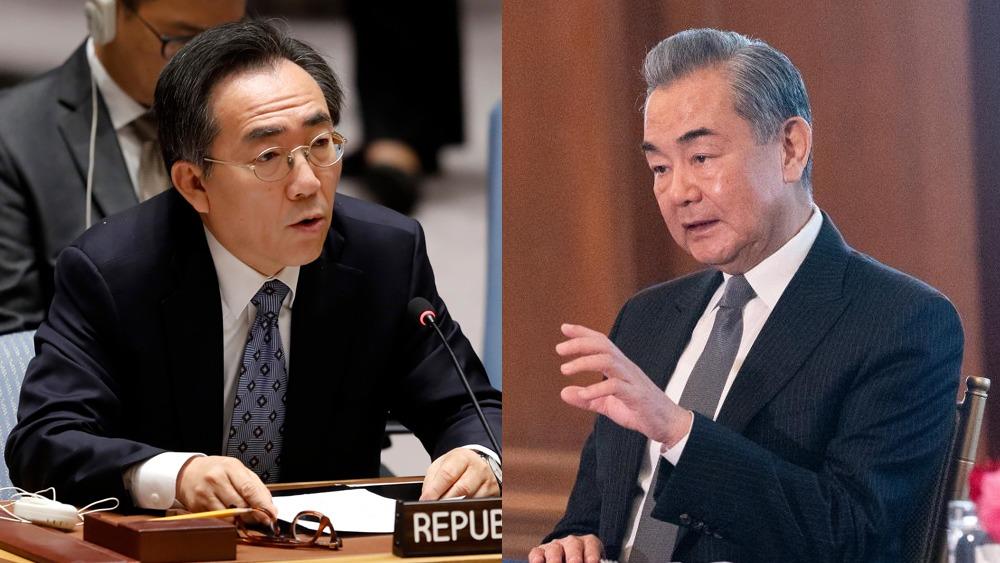 This combo photo shows Chinese Foreign Minister Wang Yi (right) and South Korean Foreign Minister Cho Tae-yul. (PHOTOS / XINHUA&AP)
This combo photo shows Chinese Foreign Minister Wang Yi (right) and South Korean Foreign Minister Cho Tae-yul. (PHOTOS / XINHUA&AP)
BEIJING - Chinese Foreign Minister Wang Yi and his South Korean counterpart, Cho Tae-yul, held a phone conversation on Tuesday, during which the two sides voiced against the pan-securitization of economic issues.
Wang, also a member of the Political Bureau of the Communist Party of China Central Committee, congratulated Cho on assuming office, saying that China and South Korea are important neighbors and cooperative partners, and that bilateral relations have achieved fruitful results since their establishment, bringing massive benefit to the people of the two countries and playing a positive role in promoting regional peace.
Wang noted that China has maintained a stable and consistent policy towards South Korea, and has always regarded South Korea as an important cooperative partner.
Wang Yi called on both sides to jointly maintain the stability and smooth flow of the industrial and supply chains, and oppose the politicization, pan-securitization and instrumentalization of economic issues
He expressed hope that the South Korean side could stick to a positive, objective and friendly policy towards China, keep to the one-China principle, maintain the political foundation for China-South Korea relations, and promote bilateral ties to return to the track of sound and stable development.
READ MORE: Wang: China willing to work for global peace and security
Saying that the two economies are closely connected, and that the two industrial and supply chains are highly inter-embedded, Wang called on both sides to jointly maintain the stability and smooth flow of the industrial and supply chains, and oppose the politicization, pan-securitization and instrumentalization of economic issues.
For his part, Cho said that since the establishment of diplomatic ties between the two countries, bilateral cooperation has gained leap-forward development, adding that South Korea-China relations are very important.
ChoTae-yul said the South Korean side agrees that economic and trade issues should not be pan-securitized, and the two sides can strengthen communication and coordination on maintaining the stability of the industrial and supply chains
The South Korean government attaches great importance to developing relations with China, and is willing to enhance mutual trust, focus on cooperation, advance high-level exchanges, accumulate achievements in economy, culture, and other fields, and push for the sustainable development of bilateral relations, Cho said.
ALSO READ: China, S. Korea reaffirm bilateral strategic cooperative partnership
South Korea remains unchanged in its position on one-China, he said.
Noting that South Korea and China have close economic and trade ties, Cho said the South Korean side agrees that economic and trade issues should not be pan-securitized, and the two sides can strengthen communication and coordination on maintaining the stability of the industrial and supply chains.
"A near neighbor is better than a distant cousin," said Wang, quoting an old Chinese saying.
As the Year of the Dragon is just around the corner, it is hoped that China-South Korea relations will be full of vigor, show a new atmosphere, and open up new prospects in the upcoming new year, so as to bring more benefits to the two peoples, Wang said.
READ MORE: China, Japan and South Korea reaffirm climate action pledges
Both sides agreed that it is very important to reaffirm the bilateral strategic cooperative partnership between China and South Korea.
The two sides also exchanged views on the situation on the Korean Peninsula.
Not for nothing was the tense moment on the Korean Peninsula, Wang said, adding it is hoped that all parties will remain calm, exercise restraint, refrain from words and deeds that aggravate tensions, and address their respective legitimate concerns through dialogue and consultation.


